Collie
Canis Lupus
Gentle and devoted!
Advertisement
Collie Scientific Classification
- Kingdom
- Animalia
- Phylum
- Chordata
- Class
- Mammalia
- Order
- Carnivora
- Family
- Canidae
- Genus
- Canis
- Scientific Name
- Canis Lupus
Read our Complete Guide to Classification of Animals.
Collie Conservation Status
Collie Facts
Collie as a Pet:
- General Health
- Energy Level
- Shedability
- Trainability
- Intelligence
- Tendency to Chew
- Size
- Family and kid friendliness
- Yappiness / Barking
- Moderate
- Separation Anxiety
- Moderate
- Preferred Temperature
- Average climate
- Exercise Needs
- High
- Friendly With Other Dogs
- High
- Pure bred cost to own
- $375 to $1,450
- Dog group
- Herding
- Male weight
- 60-75 lbs
- Female weight
- 50-65 lbs
This post may contain affiliate links to our partners like Chewy, Amazon, and others. Purchasing through these helps us further the A-Z Animals mission to educate about the world's species.
View all of the Collie images!
The collie is a proud and playful herding dog that originally came from the hilly regions of Scotland and northern England.
Although this breed dates back centuries, it was in fact associated with and popularized by Queen Victoria in the 19th century. It later came to the attention of a wider American audience with the fictional character of Lassie. Although now a popular pet, the collie was bred first and foremost to herd livestock. The technical term for this type of dog is a header because it gets in front of the animals and guides them between the pen and grazing land.
See all of our expert product reviews.
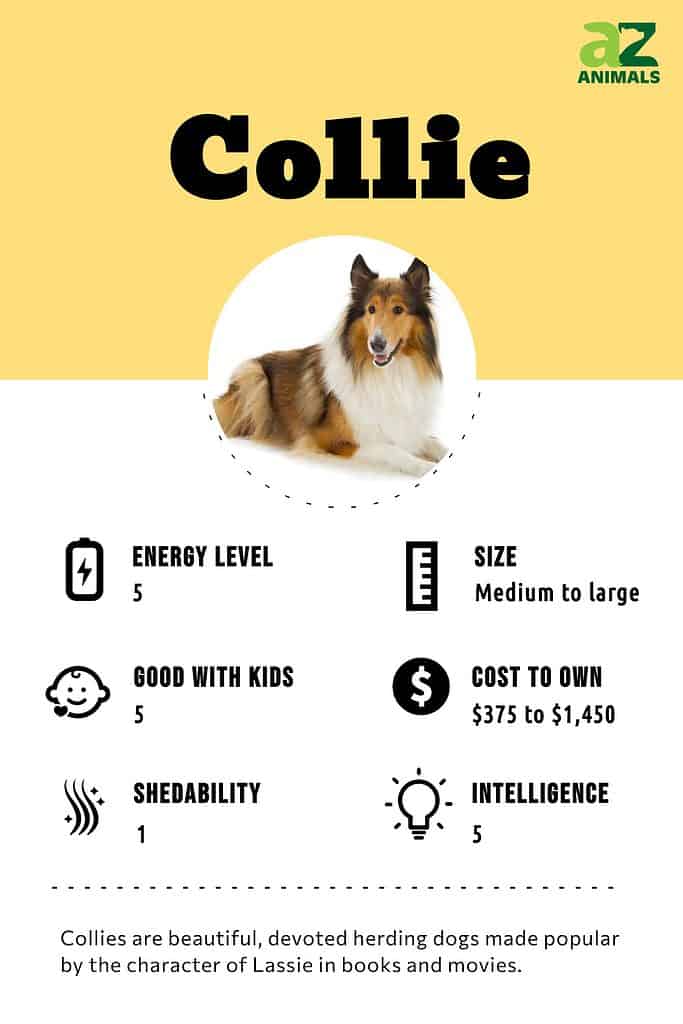
Types of Collies
The term collie can refer to either a specific breed of collie or all types of herding dogs known as collies. This includes the Border collie, bearded collie, Welsh sheepdog, and rough collie or smooth collie. All of them have different appearances and physical characteristics. The bearded collie, for instance, has long flowing hair that obscures its face. The Border collie, on the other hand, looks more like an Australian shepherd. The coat colors vary between sable and white, blue merle, or just black and white. According to the American Kennel Club, it is the 38th most popular dog breed in their database.
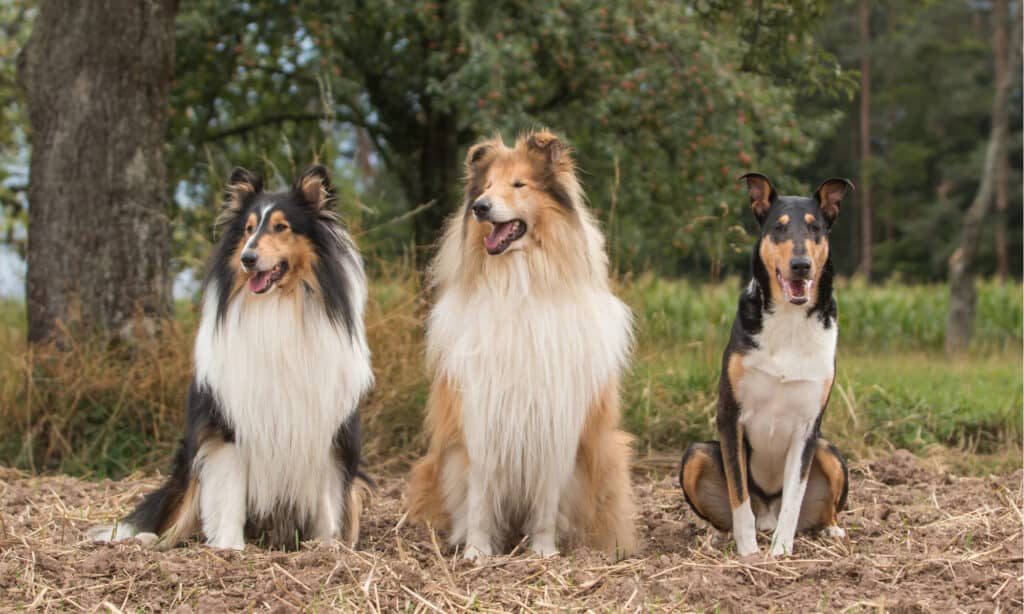
Long-haired collies are of Scottish descent – smooth-haired collies originated in England.
©Yps71/Shutterstock.com
Evolution
The collie began as a Bronze Age shepherd’s helper who may have herded and protected sheep and other livestock in what is now known as Great Britain. Collie’s are actually mentioned in Chaucer’s Canterbury Tales, written between 1387 and 1400. Long-haired collies became fixtures of the Scottish Highland landscape – while a short-haired version worked in the lowlands of Northern England. Queen Victoria fell in love with the long-haired collie while on a trip to Scotland – and popularized the breed after bringing them to court in the 1860s.
3 Pros and Cons of Owning a Collie
| A good-natured family dog The collie gets along very well with families and children. | Medium to high maintenance The collie does require a fair amount of grooming, exercise, and work to fully care for. |
| Intelligent and athletic Because of its history as a herding dog, this breed can be easily trained to perform various tricks and tasks. | Requires constant companionship It is not a good idea to let this breed remain alone for hours at a time. |
| Good health Apart from a few notable health problems, the collie usually enjoys a long and healthy life. | Barking The collie is only a moderate barker, but it may get on the nerves of some owners. |
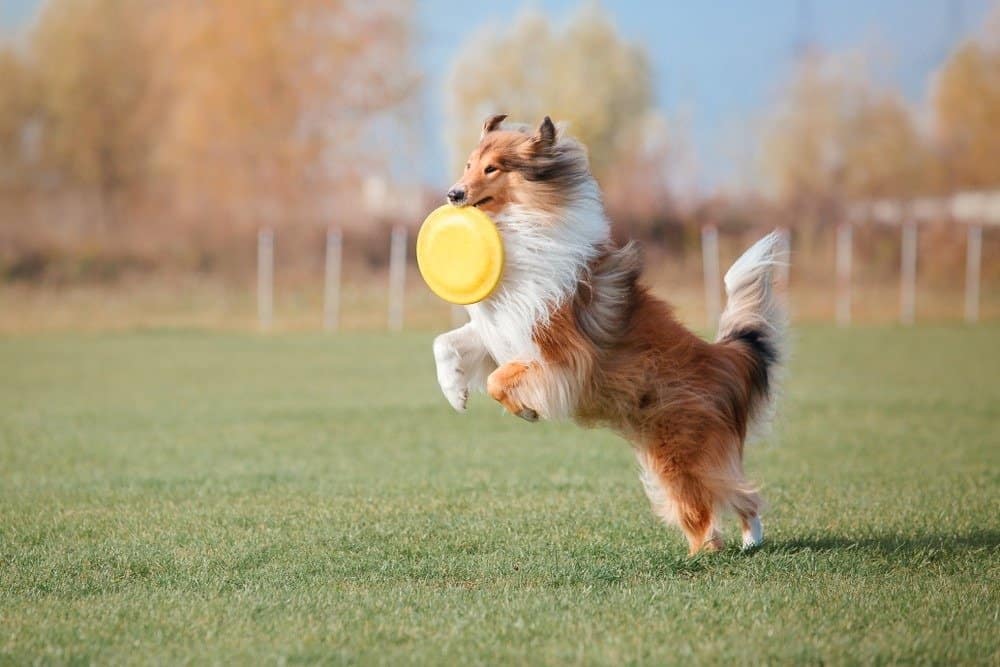
Collies are naturally athletic and highly intelligent – making them excel at learning tricks and commands.
Health and Entertainment for your Collie
See all of our expert product reviews.
©OlgaOvcharenko/Shutterstock.com
Size and Weight
The collie is a medium-sized breed with a rather large and muscular frame. Males are slightly larger than females on average. Here is a breakdown of the sizes:
| Height (Male) | 24 to 26 inches |
|---|---|
| Height (Female) | 22 to 24 inches |
| Weight (Male) | 60 to 75 pounds |
| Weight (Female) | 50 to 65 pounds |
Common Health Issues
The collie is a relatively healthy breed with a life expectancy of 12 to 14 years. One of the major health problems you should look out for, however, is susceptibility to several types of eye diseases, including collie eye anomaly (a genetic disorder that affects the development of the retina and sclera) and progressive retinal atrophy (a degenerative condition that affects photoreceptor cells).
Another potential problem is a mutation in the MDR1 gene that makes the dog more sensitive to certain drugs, antibiotics, and steroids during treatment for other conditions. A very rare genetic condition known as grey collie syndrome causes serious and recurring immune problems throughout the dog’s life. Characterized by grayer or lighter colors, few collies with this disorder live beyond a few years.
Finally, throughout the dog’s life, you should watch out for cancer, epilepsy, skin conditions, and gut bloating. To screen for potential problems, you should give it an eye check and possibly a DNA analysis as soon as possible. A high-quality breeder should ensure that few genetic problems arise early on. To sum up the most common health problems:
- Eye Diseases
- Bloating
- Skin Conditions
- Cancer
- Epilepsy
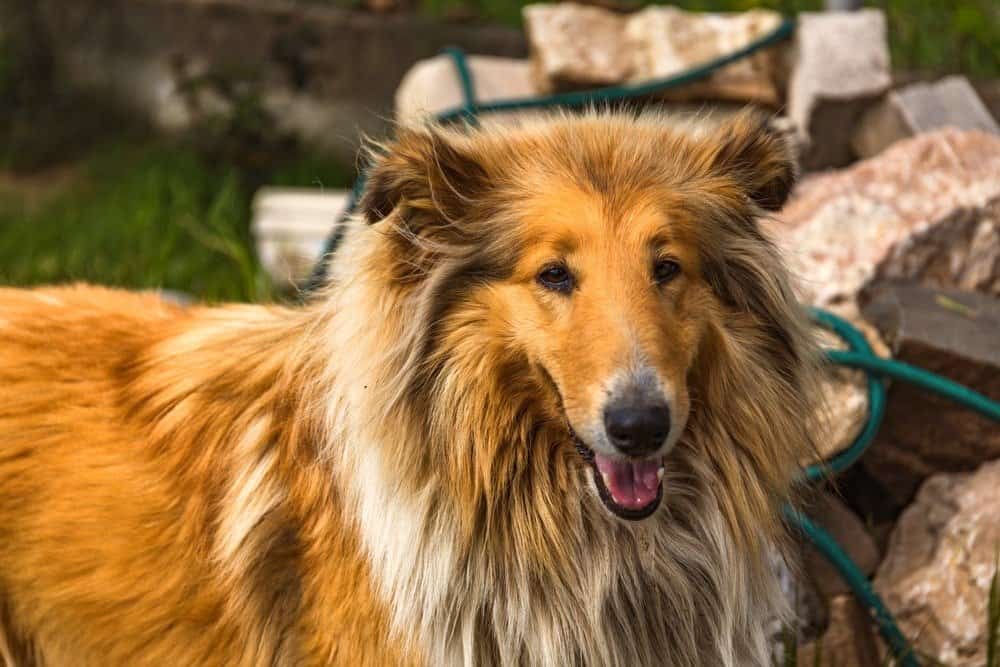
Collies are sweet, good-natured, and bred to be devoted to their people.
©Juli G/Shutterstock.com
Temperament and Behavior
The collie has a very sweet, good-natured personality with a high tolerance for adversity and relatively low stubbornness. Thanks to the collie’s breeding history, obedience and devotion are some of its many endearing qualities. The collie will invest so much time and effort into the relationship with its owner that you will find it easy to train and socialize with. It should also get along fine with other dogs. This also means, however, that the collie requires almost constant companionship and care to be fully happy and satisfied within the home.
There is a slight difference between traditional herding collies and pets or show dogs. The rough collie, smooth collie, and some types of Border collies are more show dogs with herding instincts mostly reduced or bred out. They tend to be more gentle and suitable as pets. Working types, on the other hand, are suited more for traditional herding tasks. They are still good pets, but they exhibit more herding behavior and instincts, especially during playtime.
How to Take Care of a Collie
Once you invite it into your home, the collie is a wonderful companion and pet that naturally loves people and families, but you should be prepared to invest time and effort into its care. It requires quite a lot of work to keep up with its dietary, exercise, and grooming needs. If you expose the puppy to new experiences and people from an early age, then it should be easier to socialize and train throughout its life.
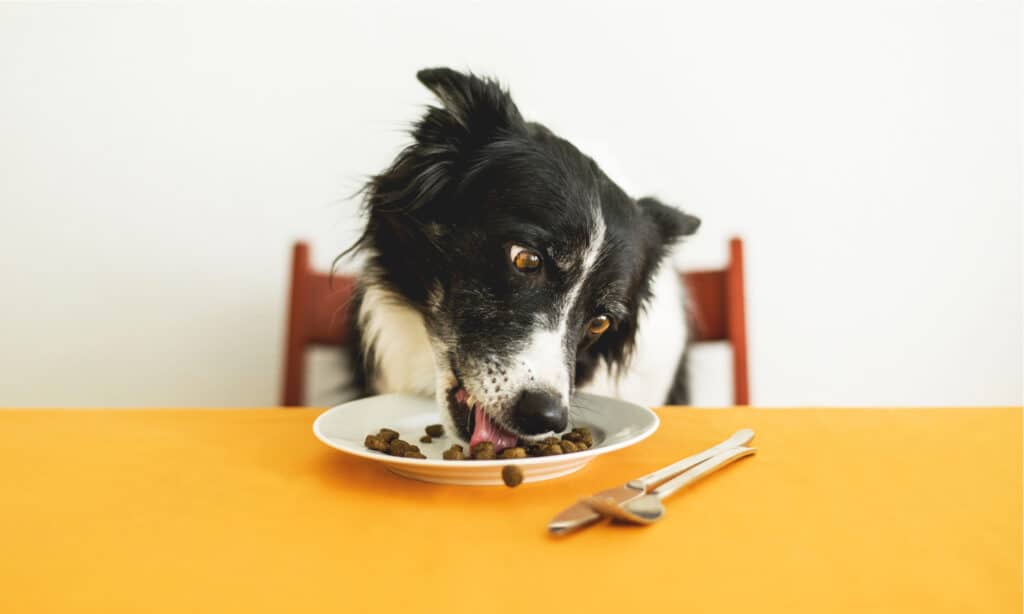
Collies need to be fed several small meals a day because of their sensitive stomachs.
©Dvorakova Veronika/Shutterstock.com
The Best Dog Food for Collies
To meet its daily requirements for exercise and activity, your collie will need high-quality dog food with more meat and fewer grains than average, and almost no corn or soy. Because of the breed’s gut sensitivities, it should be fed multiple times a day instead of just once. Treats should be given as part of the training process, but don’t overdo it. Too much food at once or too close back-to-back with exercise can result in bloat and stomach issues.
This breed sheds a ton, and while it certainly won’t stop shedding completely, there is dog food on the market to help keep shedding under control as much as possible.
At A-Z Animals, we find that the best dog food for Collies is Canidae Pure Limited Ingredient Premium Adult Dry Dog Food.
One reason we like this option for Collies is that it eliminates corn, soy, and wheat from their diet. Additional digestive aid comes from probiotics and antioxidants. The amino acids including omegas are great for the immune system and skin, while taurine helps with eye health.
Check Chewy or Amazon for this product.
- Canidae PURE Salmon and Sweet Potato Recipe Dry Dog Food
- Contains real salmon, menhaden, fish meal, peas and sweet potatoes
- 10 or fewer key ingredients for sensitive dogs
- Antioxidants and probiotics to support healthy digestion and and immune health
- Vitamins and minerals to support healthy joints, skin and coat
Maintenance and Grooming
The collie has a double coat of fur that requires regular brushing around two or three times a week. A thorough brush, especially behind the ears and elbows, will help to remove loose fur on the undercoat and prevent matting. Nail trimming and the occasional ear cleaning should be given as well. The collie is a moderate shedder with a few periods of heavier shedding during certain seasons of the year. If a female collie is not spayed, then she may shed for a full three-month period after her heat cycle.
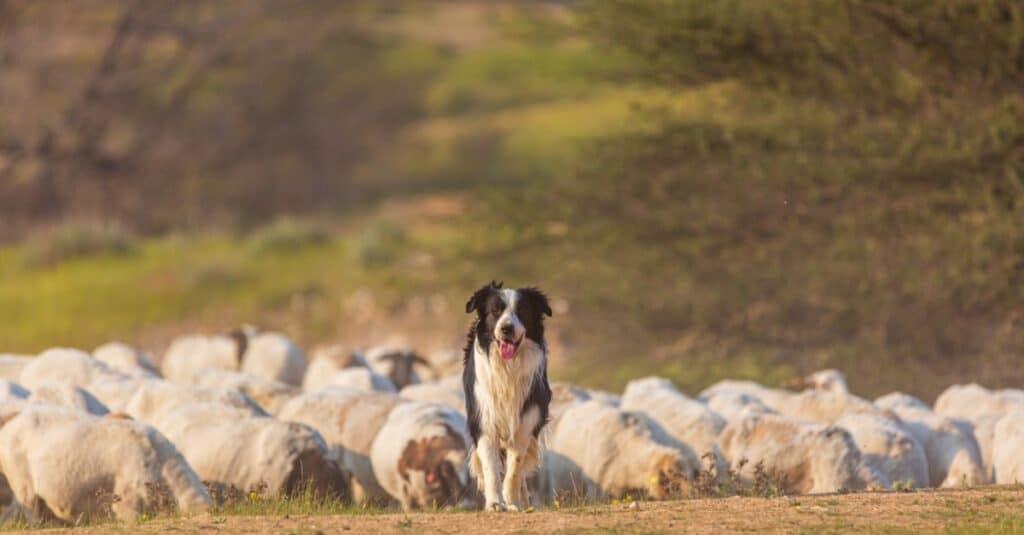
The intelligence of the border collies makes it one of the most popular types of farm dogs.
©iStock.com/Vladimir1965
Training
Thanks to its keen intelligence and patient and obedient personality, the collie is a very easy breed to train. Putting full faith in the owner, this breed excels at whatever you teach it, from herding to agility training to simple tasks. It offers endless possibilities for an owner who is willing to do something creative and fun with it. You should try to reinforce its behavior with friendly and positive teaching methods. Negative methods might easily discourage it.
Exercise
The collie requires a lot of daily exercise in the form of walks, running, sports, and games. One or two hours a day should suffice, but it is never a bad idea to get more. The collie will be most satisfied if you let it loose in an enclosed yard, a big park, or any other wide open space.
You can also teach it to fetch or perform agile tricks. Because of its tendency to become bored or anxious without companionship, it is not necessarily a good idea to leave the dog alone in the backyard for long periods of time. In summation, the collie is a very active breed that requires a good amount of exercise, but the good news is that as long as you meet its exercise requirements, the collie should settle down for the rest of the day.
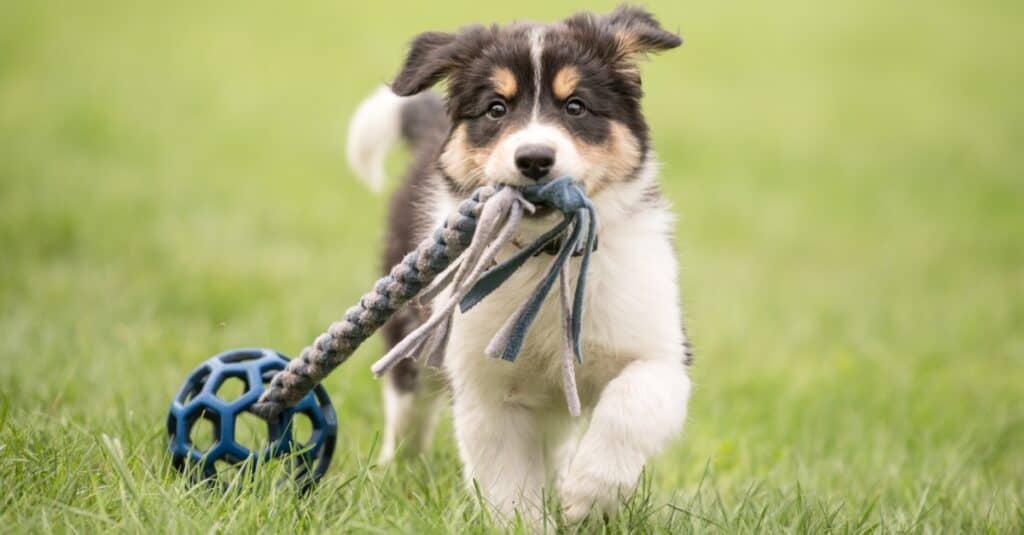
Collie pups are easy to train and loads of fun
©iStock.com/K_Thalhofer
Puppies
There are a few things you will want to keep in mind with a collie puppy. First, because of the prevalence of genetic conditions, it is a good idea to have a health screening. Second, you should have the puppy checked for eye disease at the age of six to eight weeks by a certified veterinary ophthalmologist. Third, you will want to put it through training as soon as possible.
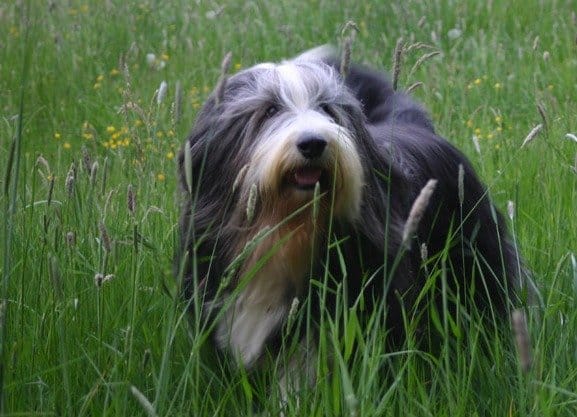
Collies are sweet-natured and good with children.
©Balbriggan, CC BY 3.0, via Wikimedia Commons – License
Collies and Children
Among all types of medium- or large-sized dogs, the collie may be one of the ideal breeds for your children. Friendly, loyal, and intelligent, it is both a good companion and a source of responsibility that your children can share in. If you are worried about the dog’s excitability, then it may be a good idea to purchase a more gentle show dog like a rough collie instead of a pure herding dog. This breed does have a moderate tendency to bark as well. This might be a concern around smaller children who frighten easily.
Breeds Similar to the Collie
If you are interested in the collie, then you should check out these other breeds of herding dogs:
- Australian Shepherd – This highly energetic herding dog is one of the most popular breeds in the world. It is intelligent, playful, and caring, but also requires high maintenance and care. The Australian Shepherd actually shares a deep ancestry with modern collies.
- German Shepherd – This big, strong, and intelligent breed is also one of the premier working dogs around the world. The German shepherd is used for search and rescue, disability assistance, and policing. It also makes for a fantastic, loyal, inquisitive, and confident pet. One downside is that it can sometimes become a little too protective of its owners without proper socialization.
- English Shepherd – Although not recognized by the American Kennel Club, the English shepherd is still a popular breed in the United States. Like the Australian shepherd, it shares some ancestry with the modern collie. It is loyal, intelligent, and athletic.
Popular Names for the Collie
According to the website rover.com, these are some of the most popular names for the Border collie specifically:
- Luna
- Bella
- Lucy
- Sadie
- Charlie or Charley
- Daisy
- Max
- Molly
- Bailey
- Zoey or Zoe
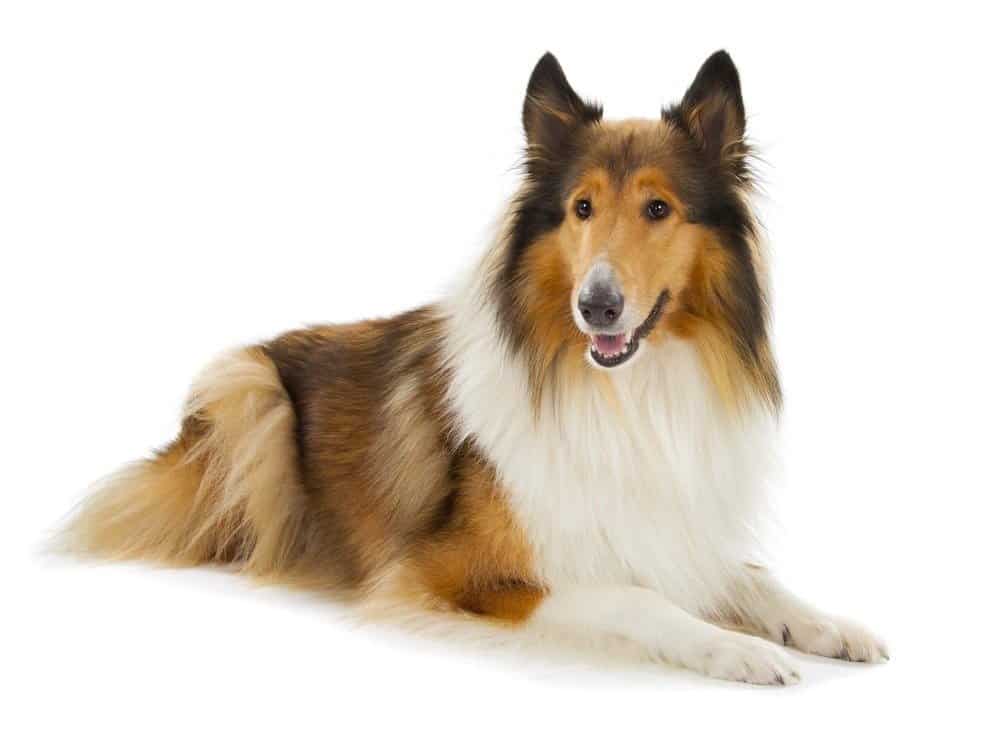
Lassie was a beautiful Scottish or rough collie who made the breed popular worldwide.
©Nikolai Tsvetkov/Shutterstock.com
Famous Collies
The modern collie has a long history of representation in American culture and fiction. Here are just a few of the most famous collies:
- Lyndon Johnson kept a pet collie called Blanco. This pure white collie was a gift to the then-president from a young girl in Illinois.
- Reveille is the official mascot of Texas A&M University. Since around 1931, a collie has accompanied the football team onto the field each season. The dog earned its name, which is the word for a bugle call after it began barking at the sound of a trumpet on campus.
- The 1940 novel Lassie Come Home introduced the world to perhaps the most famous collie of all time. This novel would later spawn several popular films and a TV show. The very first Lassie was played by a male rough collie called Pal. He lived between 1940 and 1958.
Collie FAQs (Frequently Asked Questions)
Are collies a good family dog?
The collie is an excellent family dog that truly loves to be around children. The rough collie (the Lassie-type breed with long brown and white fur) and the smooth collie (a short-haired version with black colors) are particularly noted for their gentility, but any type of collie would make for an excellent family dog.
Do collies shed a lot?
The collie does shed moderate amounts and may require extra brushing in certain parts of the year.
Are collies aggressive?
Despite their history as a herding dog, collies have a rather pleasant and docile temperament that gets along well with almost everyone.
Do collies bark a lot?
Collies have a moderate tendency to bark, especially when they become overly excited or bored.
Do collies have health problems?
The collie does have a tendency to inherit some eye problems and drug sensitivities. But compared to the average breed, the collie has an excellent health record.
Are Collies herbivores, carnivores, or omnivores?
Collies are Omnivores, meaning they eat both plants and other animals.
What Kingdom do Collies belong to?
Collies belong to the Kingdom Animalia.
What class do Collies belong to?
Collies belong to the class Mammalia.
What phylum to Collies belong to?
Collies belong to the phylum Chordata.
What family do Collies belong to?
Collies belong to the family Canidae.
What order do Collies belong to?
Collies belong to the order Carnivora.
What type of covering do Collies have?
Collies are covered in Hair.
What genus do Collies belong to?
Collies belong to the genus Canis.
What is an interesting fact about Collies?
Collies are gentle and devoted!
What is the scientific name for the Collie?
The scientific name for the Collie is Canis Lupus.
What is the lifespan of a Collie?
Collies can live for 13 years.
What's the difference between collies and border collies?
There are a few key differences between collies and border collies. Border collies require far more exercise than rough collies, and collies also have longer coats than border collies do.
What's the difference between scotch collies and rough collies?
Scotch collies predate the rough collie breed and were in fact the inspiration for them. However, the scotch collie does not have a regulated purebred look like the rough collie does.
What are the key differences between Shelties and Collies?
The key differences between Shelties and Collies are size, coat color, drooling tendency, temperament, energy level, and grooming needs.
Thank you for reading! Have some feedback for us? Contact the AZ Animals editorial team.
Sources
- David Burnie, Dorling Kindersley (2011) Animal, The Definitive Visual Guide To The World's Wildlife
- Tom Jackson, Lorenz Books (2007) The World Encyclopedia Of Animals
- David Burnie, Kingfisher (2011) The Kingfisher Animal Encyclopedia
- David Burnie, Dorling Kindersley (2008) Illustrated Encyclopedia Of Animals
- Dorling Kindersley (2006) Dorling Kindersley Encyclopedia Of Animals
- American Kennel Club, Available here: https://www.akc.org/dog-breeds/collie/
- PDSA, Available here: https://www.pdsa.org.uk/taking-care-of-your-pet/looking-after-your-pet/puppies-dogs/medium-dogs/border-collie
- Collie Health Foundation, Available here: https://www.colliehealth.org/
- (1970)


















